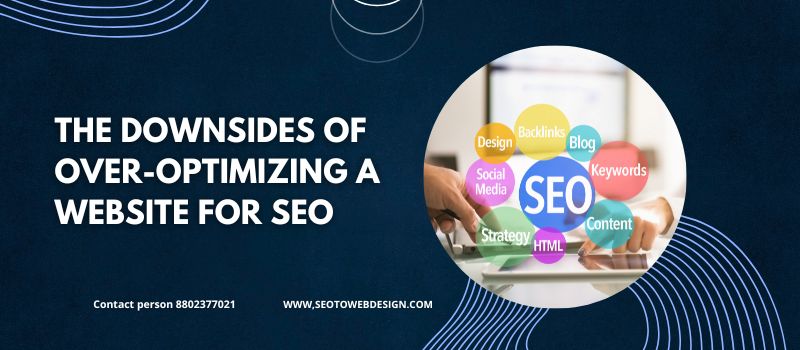What Is Over-Optimization?
Over-optimization occurs when a website applies excessive or aggressive SEO strategies in an attempt to manipulate search engine algorithms. While SEO best practices aim to enhance visibility and ranking, over-optimization crosses a line where the site’s content, design, or structure becomes too focused on pleasing search engines rather than delivering value to users.
Downsides Of Over-Optimizing Your Website For SEO
1 .Keyword Stuffing
One of the most common over-optimization mistakes is keyword stuffing. This occurs when webmasters use excessive keywords in their content, hoping to rank higher for specific terms. While keywords are essential for SEO, cramming too many into your text can have adverse effects.
- Negative Impact on Readability: Keyword-stuffed content becomes awkward and unnatural, which can frustrate readers and diminish their overall experience. If users struggle to read and engage with your content, they are likely to leave your site, increasing your bounce rate.
- Search Engine Penalties: Search engines like Google use sophisticated algorithms that can detect when websites are overusing keywords. Rather than boosting your ranking, keyword stuffing can result in penalties, leading to lower rankings or even de-indexing from search results.
2. Unnatural Link Building
Links are crucial for SEO, but excessive or unnatural link-building practices can backfire. Over-optimization in this area often involves generating numerous low-quality backlinks or participating in link schemes to manipulate rankings.
- Risk of Google Penalties: Google’s algorithms, such as Penguin, are designed to identify manipulative link-building practices. Websites that engage in excessive or spammy link building risk penalties, causing them to lose visibility or drop in rankings.
- Reduced Credibility: Focusing too much on acquiring backlinks from any source, regardless of relevance, can hurt your website’s credibility. Search engines value high-quality, relevant links, and too many irrelevant or low-authority links can harm your reputation.
3. Over-Optimization of Anchor Text
Anchor text—the clickable text in a hyperlink—is a vital SEO element, but it can also be over-optimized. When webmasters use the same keyword-rich anchor text repeatedly to manipulate rankings, search engines may view this as an attempt to game the system.
- Unnatural Link Profile: A website with an unnaturally high percentage of keyword-rich anchor text can raise red flags for search engines. They prioritize diversity in anchor text, so excessive repetition can lead to penalties.
- User Experience: Over-optimizing anchor text can result in unnatural linking patterns, making the content look forced and spammy. This can decrease user trust in your website and affect their overall experience.
- Violation of Search Engine Guidelines: Cloaking and hidden content directly violate Google’s Webmaster Guidelines. Once detected, these practices can lead to severe penalties, including a complete removal from search results.
- Loss of Trust: Cloaking and hidden content undermine user trust. If users realize they are not seeing the same content as search engines, they may question the integrity of your website and brand.
- Compromised User Experience: Sacrificing visual appeal or functionality for faster loading times can result in a website that lacks engagement and fails to hold users’ attention. Striking a balance between speed and design is key to maintaining both user satisfaction and SEO performance.
- Higher Bounce Rates: If users find your site unappealing or challenging to navigate because of overly simplified design choices, they are likely to leave quickly, increasing your bounce rate and negatively impacting SEO.
- Ignoring Content Quality: No amount of technical optimization can compensate for poor-quality content. Search engines prefer content that is high-quality, relevant, and valuable, ensuring it effectively addresses user needs and interests. Over-optimizing technical SEO at the expense of content quality can hurt your rankings in the long run.
- Unbalanced SEO Strategy: Technical SEO is just one part of a broader strategy. Overemphasizing it while neglecting on-page SEO, content creation, and user experience can lead to an unbalanced approach that fails to deliver results.
4. Cloaking And Hidden Content
Cloaking involves showing different content to search engines than what is visible to users. It’s a deceptive practice that over-optimizers use to manipulate rankings. Similarly, some webmasters use hidden content, such as white text on a white background, to stuff keywords without disrupting the visible content.
5. Over-Optimizing For Speed At The Expense Of Design
Website speed is crucial for SEO and user experience, but over-optimizing for speed can sometimes come at the cost of design and functionality. While it’s essential to have a fast-loading site, stripping away valuable design elements or interactive features in the name of speed can diminish user engagement.
6. Too Much Focus On Technical SEO
Technical SEO elements like metadata, sitemaps, and structured data are essential for search engine crawling and indexing. However, over-optimizing these elements without focusing on content quality and user experience can be counterproductive.
How To Avoid Over-Optimization
To prevent over-optimizing your website, focus on a holistic approach that balances all aspects of SEO. Prioritize creating valuable, user-centric content that answers your audience’s questions and solves their problems. Avoid manipulative tactics, and instead, follow best practices for keyword usage, link building, and technical SEO.
SEO should always enhance both the user experience and search engine visibility. When you focus on delivering value to your audience, search engines will recognize your efforts, and you’ll achieve sustainable results without risking penalties.

